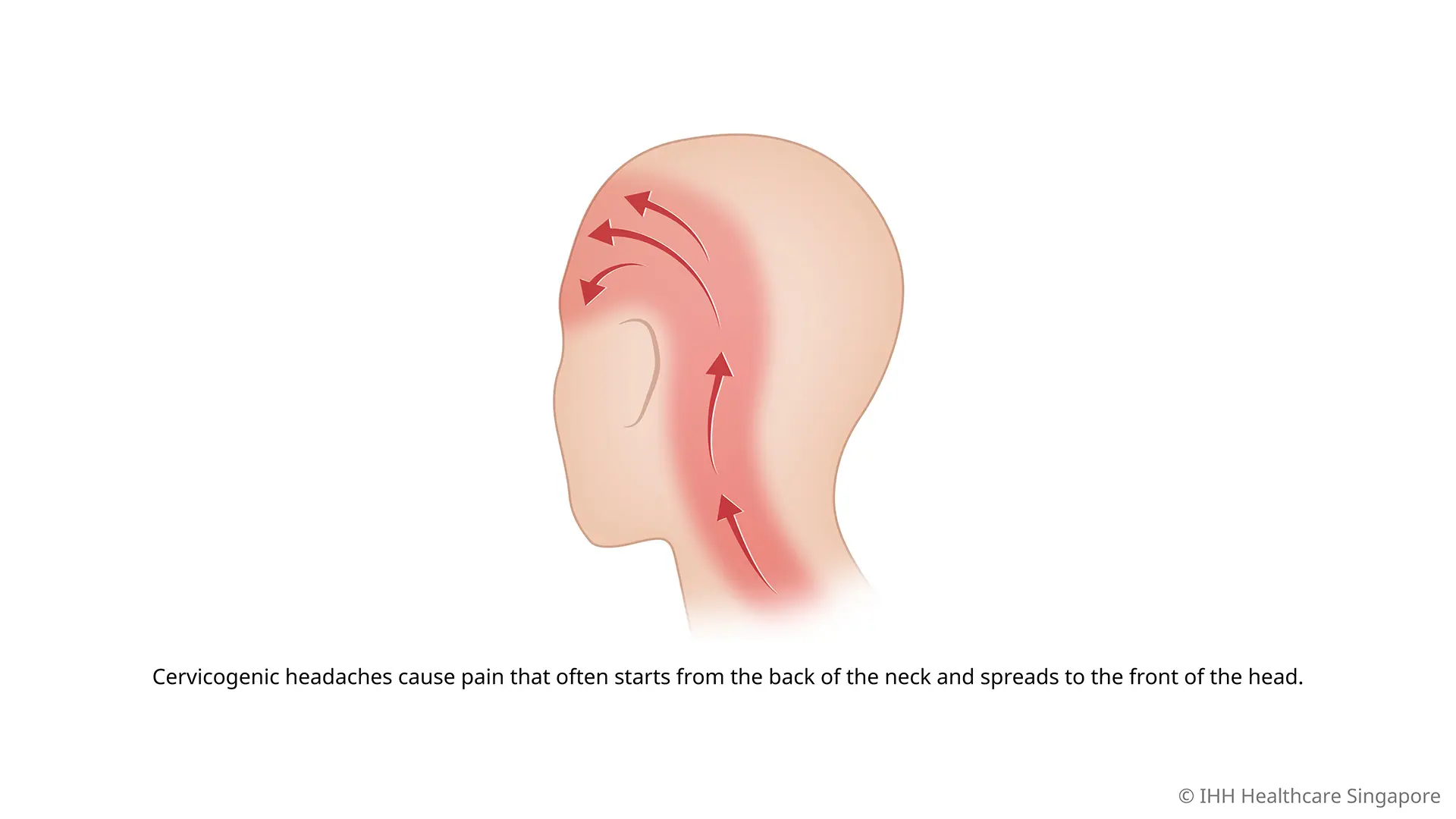
Cervicogenic Headache
What is a cervicogenic headache?
A cervicogenic headache is a type of headache that originates from issues in the cervical spine (the neck) and associated structures such as muscles, nerves, and bones. Pain is referred from the neck to the head, typically affecting one side and often associated with neck stiffness and discomfort. Cervicogenic headaches can result from various conditions, including cervical disc disease, arthritis, or muscle strain.
Types of cervicogenic headaches
Cervicogenic headaches are generally categorised based on their underlying causes:
- Disc-related cervicogenic headache, arising from issues with cervical discs, such as herniation or degeneration.
- Arthritis-related cervicogenic headache, caused by cervical spine arthritis, leading to inflammation and pain.
- Muscle-related cervicogenic headache, resulting from muscle strain or tension in the neck and shoulders.
What are the symptoms of a cervicogenic headache?
Symptoms of a cervicogenic headache can include:
- Pain on one side of the head, often starting at the back and radiating to the front
- Neck pain and stiffness
- Reduced range of motion in the neck
- Pain that can be exacerbated by certain neck positions or certain movements like head turning, coughing, sneezing, or straining.
- Tenderness in the neck and shoulder muscles
- Pain that can spread to the forehead, temples, or area around the eyes
- Nausea and sensitivity to light or sound in some cases
When to seek medical attention?
You should seek medical attention if:
- You experience persistent or severe headaches that do not improve with over-the-counter medications
- The headaches are accompanied by significant neck pain and stiffness
- Your symptoms interfere with daily activities and quality of life
- You notice any changes in the pattern, frequency, or intensity of your headaches
When to visit an urgent care centre?
Visit an urgent care centre if:
- You have a sudden, severe headache that is different from your usual headaches
- The headache is accompanied by neurological symptoms such as weakness, numbness, or difficulty speaking
- You experience high fever, stiff neck, or signs of infection
- The pain is severe and unmanageable with usual treatments
What causes a cervicogenic headache?
Cervicogenic headaches are caused by issues in the cervical spine and surrounding structures, including:
- Cervical disc disease, which refers to herniated or degenerative discs in the neck which compress the nerves.
- Arthritis, which refers to osteoarthritis or rheumatoid arthritis affecting the cervical spine.
- Muscle strain, due to overuse or injury to neck and shoulder muscles.
- Whiplash injury, due to sudden neck movement causing strain or damage.
- Ligament strain, due to strained ligaments in the neck that contribute to pain and headaches.
- Poor posture, due to long periods of poor posture, especially while sitting or working at a computer.
What are the complications of a cervicogenic headache?
While cervicogenic headaches themselves aren't life-threatening, chronic pain and dysfunction can lead to complications that affect your quality of life:
- Chronic pain and discomfort in the neck, head, and even shoulders
- Reduced neck mobility and function, making it difficult to turn your head, look up or down
- Increased risk of developing chronic headache disorders
- Impact on daily activities and quality of life
- Potential for medication overuse if self-treating with painkillers
- Disrupt sleep patterns, leading to fatigue and daytime sleepiness
How do you prevent a cervicogenic headache?
Preventing cervicogenic headaches involves managing risk factors and adopting healthy habits:
- Maintain proper posture while sitting, standing, and working.
- Ensure your workstation is set up to support good posture and reduce neck strain.
- Strengthen neck and shoulder muscles through regular exercise.
- Incorporate stretching exercises into your routine to maintain flexibility.
- Engage in stress-reducing activities such as meditation, yoga, or deep breathing exercises.
- Avoid activities that place excessive strain on your neck.
- Use a supportive pillow that keeps your head and neck in proper alignment for better sleep posture.
- Take breaks, hold your phone at eye level, and limit screen time before bed, as looking down at your phone for extended periods can strain your neck muscles.
- Maintain a healthy weight, as excess weight can put additional strain on your neck and spine, potentially contributing to headaches.
- Stay hydrated by drinking plenty of water throughout the day and avoid excessive alcohol consumption and caffeine intake, as dehydration can contribute to muscle tension, including in the neck.
This page has been reviewed by our medical content reviewers.
Need help?
For enquiries, please call
+65 6250 0000 (Orchard) or +65 6898 6898 (Novena)
For appointment bookings, please WhatsApp
+65 8111 7777 (Orchard) or +65 8111 5777 (Novena)
 Brain & Spine Care
Brain & Spine Care








